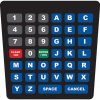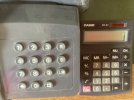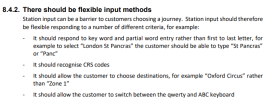There's a lot more to the design of the human-machine interface than the choice of ABC or QWERTY.
For example, the height, size, etc of a keypad, screen etc, the 'angle of attack' (must be a techie word

) of the finger(s), the reading of a code for the ticket, the understanding of ticket types and availability, the number of machines/ size of queue(s); is the word ergonomics? Differing size of humans, including kids, wheelchair accessibility, ...
This thread displays a lot of possibly unwitting unconscious assumptions about 'people (un) like us'. Over time a 'standard' was determined regarding, for instance wc dimensions- is there such for a TVM, or is it 'the (international) market' decides?
I saw a lot of designs by 'Googling'!! Perhaps an opportunity for some research, a PhD study?
Personally, I find 'stabbing' at a screen tiresome, esp needing to constantly correct incorrect input and getting angry with myself and feeling the 'weight' of the queue behind.
I imagine the replacement of QWERTY by ABC, that started this thread, was based on something other than a whim.



